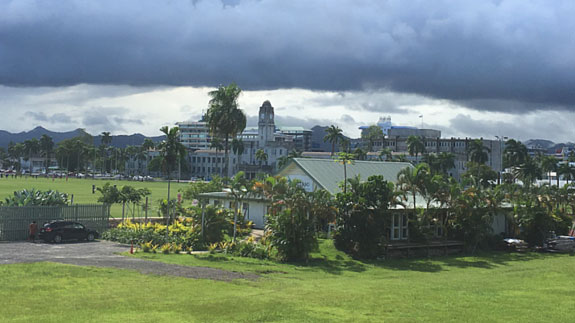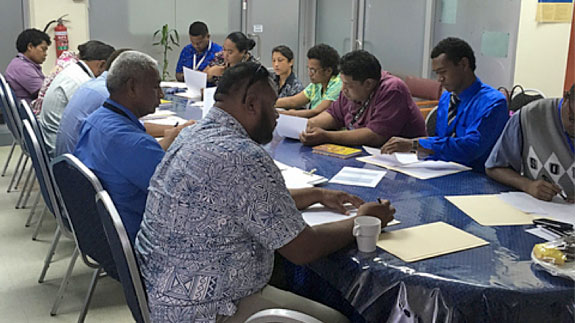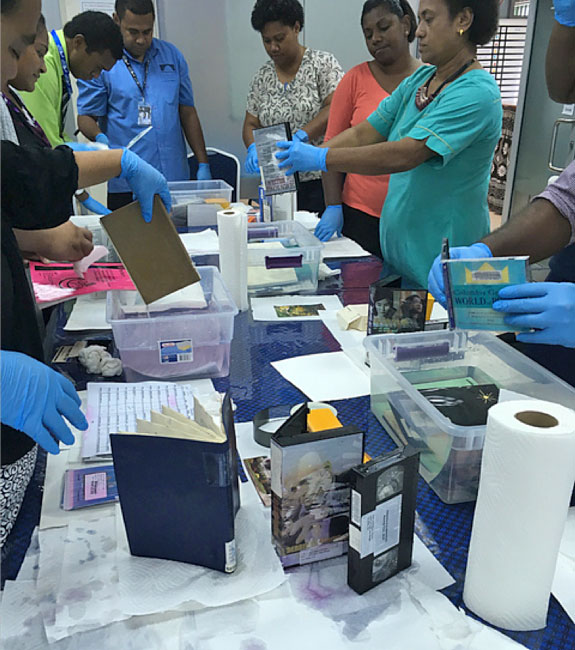Disaster Preparedness Workshop, National Archives of Fiji
Suva, Fiji, March 11-15, 2019

During the middle of March I arrived to conduct a Disaster Preparedness Workshop at the National Archives of Fiji (NAF) in Suva, Fiji. About fifteen participants took advantage of this opportunity to learn about disaster planning for their archives and libraries. Most of the participants were from NAF, however, there were a couple of attendees from the National Museum of Fiji, the Library Services of Fiji, as well as the director of the National Archives of Tuvalu.
The outcome of the workshop was to have the participant learn about a ten step process on developing their own disaster plan for their respective organizations. The theme of the workshop was to be proactive. In fact, the staff of the NAF took the workshop a step further, became proactive, and developed their plan during the same week.
The workshop ran from 9am to noon, Monday through Wednesday. On Day 1 we concentrated on the first four steps of the plan that included: Writing the Introduction, Risk Assessment, Reducing the Risks and Establishing Support Networks. The group worked on a couple of exercises and spent a lot of time on assessing their internal and external risks of their organizations.

Day 2 of the workshop focused on Disaster Response, and we examined steps five through seven. These included, Establishing a Disaster Response Team, Vital Records, and Preparing a Disaster Response Plan. The main exercise for this day focused on identifying vital records of the participant's organizations. We looked at assessing both government and cultural records.
Finally, on Day 3 we concentrated on Disaster Recovery, step eight, and also added the last two step of the disaster plan. These included, Training the Staff and Reviewing the Plan. The Disaster Recovery portion of the workshop also included a hands-on exercise on How to Handle Wet Material. For this exercise I brought plastic tubs full of different kinds of material such as, paper documents, VHS, photographs, microfilm, CDs, and books. I then filled the tubs with water, and together, we went through the process on salvaging each material.

On Thursday I returned to the NAF in the morning to guide the Disaster Preparedness Committee to completing their disaster plan. We actually met in the afternoon after each workshop. Some of the steps takes a lot of planning and discussion. Assessing and writing the internal and external risks to the archives and the archives building took an entire afternoon. Compromising on the selection of the vital record collections within the archives was also quite time consuming and took most of another afternoon. Nevertheless, by Friday, NAF had a plan in place, which they will then submit to their minister.
Then, on Thursday afternoon I headed over to Sacred Heart Cathedral to meet with Katherine Foi and Marina Konrote, who is the Chancellor of the Archdiocese. Marina looks over the diocese archives, which is closed to the public and in need of care. The archives is located on the second floor of the diocese headquarters in central Suva, and the collections are contained in one, small room. Space to house new collections will definitely be an issue in the near future. Katherine and I looked over the collections and decided to create a project on preserving one of the oldest and most important collections. This project is slated for later 2019.
Finally, I would like to graciously thank the National Archives of Fiji for hosting the event, and providing tea-time snacks, as well as providing a delicious Fijian lunch for the participants at the end of each day. I would also like to sincerely thank the attendees of the workshop for their participation and the desire to be prepared.
